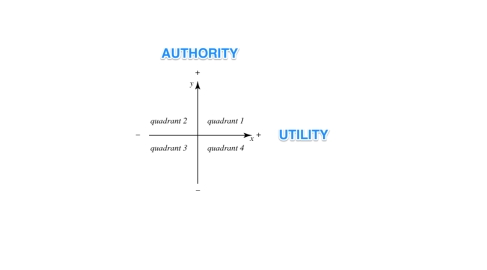Applied Doctorates
Many think of PhDs as strong and EdDs as weak. I look at it differently. My PhD is in “Applied Anthro” so I have been dealing with these sorts of issues for some time. Rather than a single continuum from “strong to weak” or “good to bad”, I believe a better approximation would include the two continua of “authority” and “utility”.
The authority continuum begins from the positive end indicating the commanding influence of pure academic knowledge, vetted by the elite of the intellectual community and pruned to the point of perfection. The negative end of the authority continuum represents the least reliable, spurious opinion that is equivalent to a random response.
The utility continuum begins from the positive end indicating such an extreme version of usefulness as to approach the status of “required” or “that which one cannot live without”. The negative end of the utility continuum represents a level of inutility as to represent something without any value whatsoever.
In this way, four options become available:
1. Applied Doctorates that balance authority with utility.
2. Traditional PhD Doctorates that represent the pinnacle of authority but are often not very applicable to the real world.
3. Academic Bachalors Degrees (e.g., Anthropology). Not very useful or authoritative in and of itself.
4. Professional Bachalors Degrees (e.g., Engineering) or Terminal Masters Degrees (e.g., MSW).
